|
Society News
1
2
3
4 5
6 |
|
Share this page with your friends |
|
|
www.blacktiechina.com
Wang Chaobin - Forbes Business
Forum
|
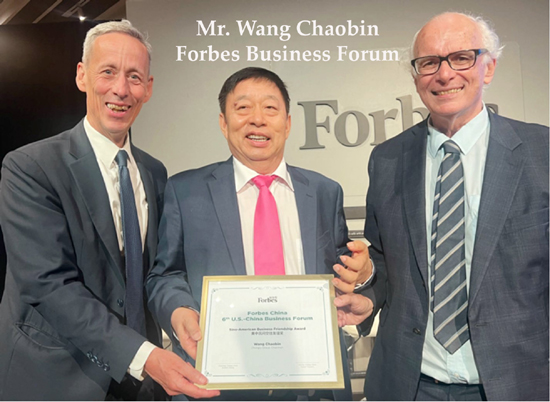 |
Wang Chaobin:
A Forbes Chinese Real Estate Tycoon
Navigating Turbulent Sino-U.S. Relations
Written By
Jeannie Yi
|
|
|
I met Mr. Wang
Chaobin for the first time four days ago,
on August 27th, at the Forbes Business Forum in Manhattan.
He was the first speaker, and his speech immediately caught my attention.
I was struck first with surprise, then with admiration. The
surprise came because, in recent years, American media and
public discourse have been overwhelmingly critical of China.
The two U.S. political parties may attack each other on
every issue, but they stand united when it comes to
resisting China. Many of my American friends who were once
extremely friendly toward China now express confusion about
the current situation. Yet, they remain steadfast,
navigating the perilous waters of Sino-U.S. relations, with
a hope to build a bridge that allows both sides to interact
freely once more.
Take, for example, Steve Orlins, sitting in front of me in
the first row. He's the Chairman of the National Committee
on U.S.-China Relations and the former Asia Chairman of the
Carlyle Group, one of the world's largest private equity
firms. He’s a prime example of someone committed to
fostering better relations. Last year's welcome dinner for
President Xi in San Francisco, following the Xi-Biden
meeting, was organized by the National Committee, and it was
a hot ticket
—attended by Fortune 500 companies.
A few months ago, at the Harvard China Forum, I happened to
be seated behind Mr. Orlins. His speech that day revolved
around a Chinese saying:
"You have me in you, I have you in me."
He had just returned from China after a 1-hour, 45-minute
conversation with President Xi Jinping and had briefed the
U.S. Congress upon his return. The phrase "You have me in
you, I have you in me" left Congress puzzled. "What does
that mean?" they asked. American think tanks, scholars,and
sinologists analyzed Xi Jinping’s frequent use of Chinese
idioms and concluded it meant "integration."
|
|
|
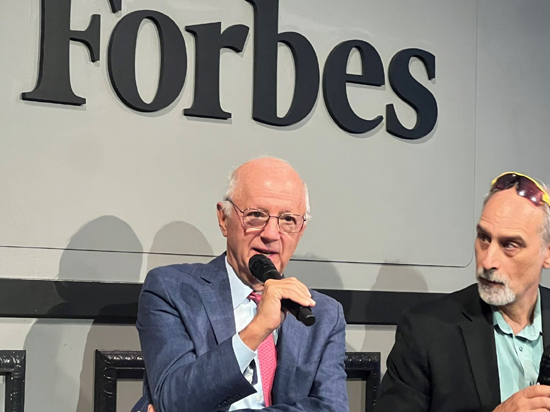 |
|
Steve Orlins
speaking at the Forbes forum |
|
|
Integration?
Business Entrepreneurs are open to sharing markets and
profits, but politicians? They’re not keen on sharing power
equally. After further discussion with Mr. Orlins, we
thought another phrase might be more understandable to the
Congress: "If the lips are gone, the teeth will feel the
cold." Maybe they’d get that? But who wants to send that
kind of message out? To turn Sino-U.S. relations into a game
of three-way contention? In America’s eyes, Russia is
already disintegrated.
The U.S. also has vast oil reserves, similar to Russia’s underground
resources. It's not just about the oil underground but also
the ownership models above ground. For example, in Alaska,
when large oil reserves were discovered, the first question-
who owned them- came up. The Alaskan people owned the land,
but could they dig for the oil barehands? All parties
related formed an equity fund, and everyone got a stake.
This is the new "equity society" model currently proposed by
the U.S. Congress—resources owned by all.
But let’s get back to the Forbes event.
|
|
|
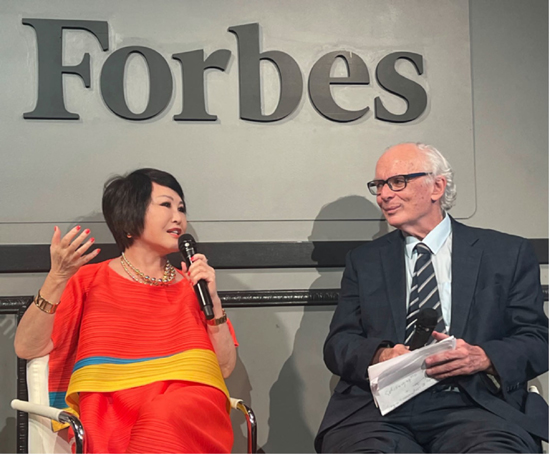 |
|
|
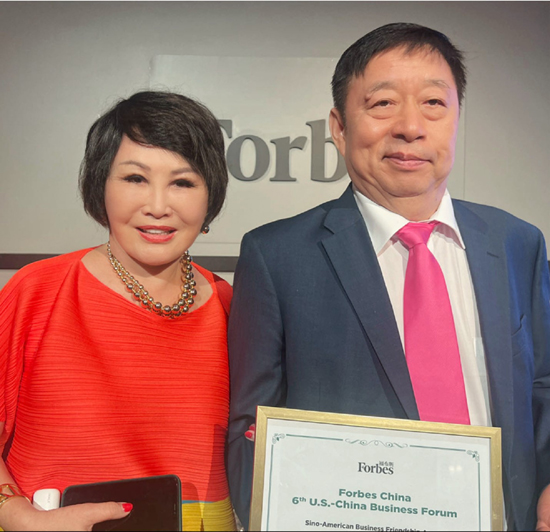 |
|
|
Sitting next to Wang
Chaobin was a former U.S. Ambassador to China. After Mr.
Wang's speech, they engaged in a quiet conversation, half in
Chinese, half in English. Mr. Wang, who has been investing
in the U.S. since the early 1990s, speaks English well.
Meanwhile, U.S.ambassadors to China are often fluent in
Chinese. Orlins, a Harvard Law School graduate, also speaks
excellent Chinese. As I listened, I realized their
conversation was about the speeches on the big screen by the
Chinese Ambassador to the U.S. and the U.S. Ambassador to
China. Both were essentially saying the same thing: China
and the U.S. need to repair their relationship. The vast
Pacific Ocean lies between the two countries, and even the
Big Bang couldn’t push them apart, so they need to find a
way to coexist peacefully.
Wang Chaobin himself embodied this spirit of coexistence,
not just through his bold words on stage, but through his
actions over the past 30 years. "I am grateful to both China
and the United States," he said.
Mr. Wang shared his story, describing how he founded China’s first
privately-owned real estate development company in the
1980s—Project No. 0001—and built the first Taiwan
Compatriots Community in China. In 1992, as the reform and
opening-up policies deepened, he built China’s first
privately-owned SanBao 三胞Economic Development Zone, covering
2 square kilometers. It became a leading example of reform
in Henan Province and across China.
Over the decades, Wang Chaobin’s companies have consistently
paid over hundreds of millions in taxes each year, with his
personal income tax leading in Henan for 40 years.
Moreover, he has “neither internal nor external debts,"
owing nothing to anyone—individual, company, or country.
“How did you manage that? Aren’t most Chinese real estate
developers known for getting land from the government,
mortgaging it to banks for low-interest loans, and then
rolling out developments, with ordinary people essentially
buying options through pre-sales?”
a typical business model.
“I’ve never sold pre-sale homes, and I’ve never overdrafted
from any bank. Last year, when the real estate market was
down and the economy was sluggish, I lent out interest-free
loans. Forbes recognized me because of my positive assets.
All my assets are real,”
Wang responded.
“And how did you earn your first bucket of gold? Don’t all
Chinese entrepreneurs have a tainted origin?” I couldn’t
help but inquired.
“In the 1980s, the government asked me to take over a
failing transport project and turn it around so that
everyone could get paid,”
Wang explained. He did just that. He later bought the
business.
|
|
|
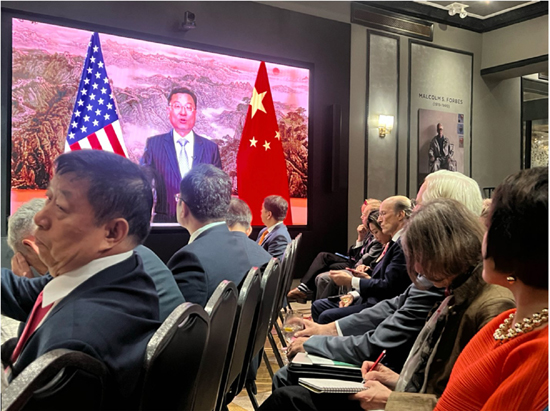 |
|
|
His story reminded
me of Zhang Ruimin, the CEO who transformed
Haier Group into a global brand.
In the mid-1980s, Zhang, then working at the Qingdao Quality
Inspection Bureau, saw a group of people arguing downstairs
because a faulty refrigerator couldn’t freeze food. The
young Zhang thought, "Why should Chinese people have to
settle for substandard products?" When he was sent to
rebuild the "Qingdao Red Star Electric Appliance Factory"
(the predecessor of Haier Group), Zhang famously smashed 76
defective refrigerators. That bold move set the foundation
for Haier to become China’s first and remains to be number
one appliance brand,
selling worldwide.
Wang continued, “I am full of gratitude to both countries".
I was fortunate to encounter China’s best period for
development, which allowed a poor kid like me to make his
first bucket of gold. After that, I just aimed to pursue the
biggest dreams, always within the boundaries of the law.
China’s open-door policy enabled me to come to the U.S.
after making my first bucket of gold.
Over the past 30 years, I worked in both countries. The U.S.
is vast and sparsely populated. Given my background in real
estate, of course, I bought large amounts of land here. Who
knows, there might even be a lot of oil under the 10 square
kilometers of the land I bought.”
In conclusion, Mr. Wang stated,
"Both China and the United States have provided
opportunities for growth and wealth for all of us. After
decades of continuously doing real estate and trade, here I
am on the Forbes Global Billionaires List in 2023.
Today, my heart is filled with gratitude for both China and
the U.S.
Now that Sino-U.S. relations are strained at the government level, it
presents us with unprecedented opportunities at the
grassroots level!”
|
|
|
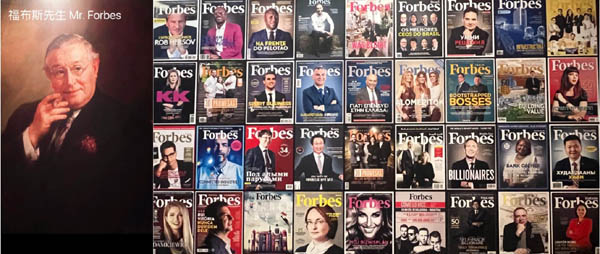 |
|
|
Listening to Mr.
Wang filled me with surprise and new hope.
Having lived in the United States for almost 40 years, many of us have
acted like bridge-builders, constantly thinking of ways to
bring the best of America to China—from the early days of
the "Eight Big Items" to new ideas like asset stripping,
debt-to-equity swaps, financing, IPO listing, and raising
global funds to help revitalize Chinese enterprises.
Now, we are finding ways to position Chinese products,
identify markets, and seek partners in the U.S. and
globally. We've come this far, helping each other and making
corrections along the way, up to 2024.
Are we now to go down a dark path just because we have
differences?
If the next era of AI and artificial intelligence becomes
the dominant force in the world, why would we think of
arming it to the teeth to cause harm instead of using it for
health and saving lives?
We must not look at today’s world with the same eyes and
knowledge from 30 years ago or govern our acts with Cold War
syndrome?
To end this article, my thanks go to the Forbes Business
Forum.
Thank you, Chairman Wang Chaobin. And my heartfelt thanks to
my dear sister, Yue-Sai Kan—without her invitation, I
wouldn’t have had the chance to witness firsthand the
genuine sentiments of Mr. Wang and Yue-Sai Kan my heroine on
stage, as well as their 30-year friendship
and the hopes for the future!
I’ve learned. I’m inspired. I’m grateful.
In them I found our common ground.
|
|
|
|
|
| |
|
| |
|